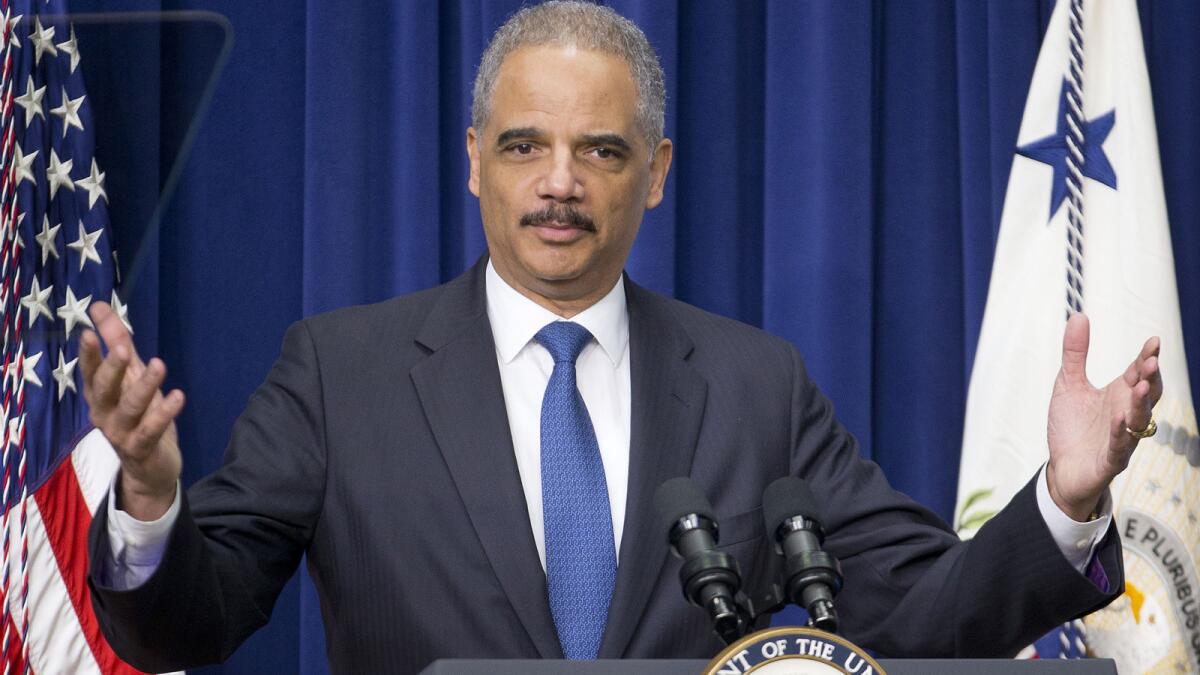Federal drug prosecutions down 6%, Holder says

- Share via
Reporting from Washington — U.S. Atty. Gen. Eric H. Holder Jr. said Tuesday that federal drug prosecutions dropped 6% last year as the Justice Department moved to pursue a fairer, smarter approach to enforcement.
In an address at the National Press Club, Holder attributed the decline to federal prosecutors concentrating on larger drug conspiracies, rather than smaller offenders.
He said it marked a sharp departure from the last 25 years, when prosecutors focused their efforts on more routine cases involving cocaine and crack users, often sending offenders to long prison sentences with no chance of parole.
The trend comes amid a Department of Justice initiative to stop seeking long prison terms for offenders arrested in nonviolent cases.
“For years prior to this administration, federal prosecutors were not only encouraged -- but required -- to always seek the most severe prison sentence possible for all drug cases, no matter the relative risk they posed to public safety,” he said. “I have made a break from that philosophy.”
Holder said “these numbers show that a dramatic shift is underway in the mind-set of prosecutors handling nonviolent drug offenses. I believe we have taken steps to institutionalize this fairer, more practical approach such that it will endure for years to come.”
Holder, who is preparing to step down as the nation’s chief law enforcement official, has made reforming federal sentencing practices a key goal of his six years at the helm of the Justice Department. Beginning in 2013, he told Congress that changes were needed to ease the prison overcrowding and bring prison sentences more in line with what is fair for individual drug offenders, rather than sending off low-level and first-time defendants to long prison terms in nonviolent cases.
In August 2013, he launched the Smart on Crime initiative and asked the U.S. Sentencing Commission to compile data for 2014, the first full year of the program.
They found that along with the 6% drop in federal drug prosecutions, from 22,215 cases in 2013 to 20,824 at the end of last year, the “severity” of other cases the government prosecuted went up. As a result of the more significant drug prosecutions, minimum sentences rose from 96 months in prison in 2013 to 98 months in 2014.
“This means that we prosecuted cases more smartly last year, doing fewer cases overall, but doing more serious crimes.”
Holder said he was particularly pleased because his prosecutors went from pursuing minimum-mandatory sentences in 63.7% of their drug cases in 2013 to only 51.4% last year. “That is the steepest drop ever,” he said. “These are extremely encouraging results.”
On Capitol Hill, Congress for several years has grappled with the twin problems of long sentences and prison overcrowding. Though three bills addressing the issues drew largely bipartisan support, none were adopted.
The same measures have been introduced in the new GOP-led Congress. Two of the bills tackle much of what Holder’s Smart on Crime program targets -- reducing or eliminating many mandatory long prison terms. But Sen. Charles Grassley, (R-Iowa,) the new chairman of the Senate Judiciary Committee, has said he is concerned that if the measures go too far, it could lead to a situation where dangerous drug offenders are returned too early to the streets.
Holder, however, noted that under the Obama administration, the overall crime rate has declined, and that for the first time in 40 years, there have been both crime reductions and a drop in the prison population. “All of this progress is remarkable,” he said.
A report last week from the Brennan Center for Justice showed that since 1990, locking up more people has had only a “limited impact” on the national crime rate. The center found that increased incarceration did bring the crime rate down by a small margin in the 1990s. But they said that after the year 2000, “increased incarceration had a negligible effect on crime.”
Rather, the Brennan center found that more police officers and an aging population has had a greater impact on lowering crime rates, and noted that several states, including California, have brought down both prison population counts and crime.
“This report amplifies what many on the left and the right have come to realize in recent years -- mass incarceration is not working. It simply isn’t necessary to reduce crime,” said Inimai Chettiar, director of the center’s Justice Program and author of the report’s executive summary.
Twitter: @RickSerranoLAT
More to Read
Sign up for Essential California
The most important California stories and recommendations in your inbox every morning.
You may occasionally receive promotional content from the Los Angeles Times.














